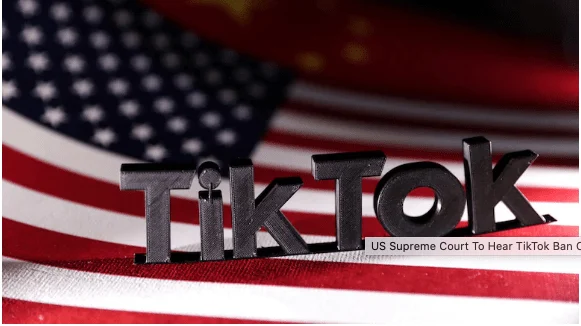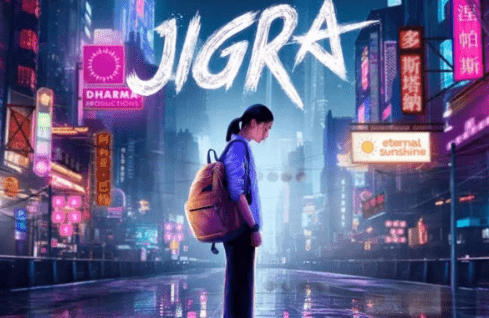The Supreme Court’s justices suggested Friday that they might uphold the federal law banning TikTok unless it separates from ByteDance. During oral arguments, they expressed doubts about TikTok’s opposition to the law. They raised the possibility of banning the app on January 19 if TikTok does not begin separating from its Chinese parent company.
The Supreme Court heard arguments on Friday regarding the First Amendment violations of the federal law. This law requires TikTok to split from parent firm ByteDance or face a ban. The federal government argued that the ban was necessary for national security because of ByteDance’s Chinese ownership. TikTok, however, contended that the ban violated their First Amendment rights by halting all communication on the platform.
Since the statute specifically targets ByteDance, a foreign-owned corporation, and its algorithm, Justices Elena Kagan and Amy Coney Barrett expressed skepticism about TikTok’s arguments. They raised doubts about how TikTok’s First Amendment rights were involved in this case.
Justice Ketanji Brown Jackson disagreed with TikTok, stating that the case did not infringe on its First Amendment rights. She believed the issue was more about TikTok’s desire to collaborate with ByteDance than about suppressing free expression.
Chief Justice John Roberts stated that the federal statute did not “burden” TikTok or its users’ expression. He contended that Congress approved of user speech on the app, as long as it wasn’t a “foreign adversary” collecting user data.
Justice Samuel Alito asked the creators of TikTok if their attachment to the app was like “somebody’s attachment to an old article of clothing.” He wondered if ByteDance had developed a “magical algorithm” that no other tech company could replicate. Alito questioned if the creators would truly suffer if TikTok disappeared or if they could switch to another platform.
Is Trump in favour of Tiktok Ban?
Since he hasn’t taken office yet, President-elect Donald Trump is not a formal party in the TikTok lawsuit. However, he has filed a brief with the Supreme Court stating that he opposes the ban and requests that the court postpone the law’s implementation until after he assumes office, rather than making a decision on it before January 19. His attorneys told the court that a stay of this kind would “crucially grant President Trump the opportunity to pursue a political resolution that could obviate the Court’s need to decide these constitutionally significant questions.” Trump is not a formal party to the case, thus the court is not required to reply to his request.
Tiktok Ban – Things to Look Out For
The Supreme Court usually takes months to issue its rulings after hearing oral arguments, but in this case, it may do so in a matter of days, and the ban is expected to go into force on January 19. The court indicated that they were ready to make a decision on the ban’s fate soon by scheduling oral arguments well in advance of the deadline rather than delaying the law’s implementation when they took up the issue.
The government’s fears about TikTok collecting data on U.S. users “seems like a huge concern for the future of the country,” Justice Brett Kavanaugh said, citing previous instances of the U.S. prohibiting television businesses from having ties to foreign governments.
“At least as I understand it, we go dark—essentially the platform shuts down,” TikTok’s attorney Noel Francisco told the court Friday regarding the implications of the federal statute if the TikTok ban is implemented. “I believe the result of this law is that it will basically cease to function.”
Can Trump Stop Tiktok Ban?
If the ban is implemented, Trump’s choices for rescuing TikTok are limited: If Trump pauses the law without proof that TikTok is separating from ByteDance, it might be overturned in court. As president, he has the authority to impose a 90-day hold on the statute if there is proof that the corporation is in the process of doing so. Additionally, Trump might attempt to negotiate a deal with ByteDance to sell the app or proclaim TikTok to be in conformity with the law, both of which might be contested in court if ByteDance still owns the program.
James Lewis, director of the Strategic Technologies Program at the Center for Strategic and International Studies, told NPR that although ByteDance has not yet agreed to sell TikTok to a U.S. company, China might be convinced to accept the deal if Trump backed off from his threat of imposing high tariffs on Chinese imports. While Francisco believed the app may go black on January 19, the day before Trump’s inauguration, he recognized Friday that Trump could postpone the ban after he assumes office. After January 20, he said, the app might be “in a different world.”
What will Happen if TikTok Ban Takes Affect?
It’s still unknown what will happen and how TikTok users would be affected if the Supreme Court upholds the ban and it goes into effect on January 19—or later, if they decide to temporarily halt it until Trump takes office. If ByteDance doesn’t divest, customers won’t be able to download or update TikTok since the federal law forbids businesses like Apple and Google from hosting the software on their U.S. app stores. This implies that as the app ages, it will eventually become outdated and unusable.
Additionally, the law forbids internet service providers, such as Oracle, which manages TikTok’s user data in the United States, from facilitating the app’s dissemination. It’s unclear how that clause will affect things: According to Francisco’s statement on Friday, TikTok has stated in a filing that it has no longer been able to “provid[e]
the services necessary for the TikTok platform to operate, so shutting it down in the US. Alan Rozenshtein, a law professor at the University of Minnesota, pointed out to
CBS News However, TikTok may simply relocate those servers outside of the United States, keeping the service operational in the country for the foreseeable future. The restriction is anticipated to affect other ByteDance-owned applications like CapCut and Lemon8, although it is still unknown what would happen to other parts of TikTok’s U.S. business, such as its Creator Fund or the TikTok shop.
TikTok Ban – Background
- Politicians from both parties expressed concerns about TikTok’s ties to China, prompting the passage of a federal bill in April.
- The federal bill mandates ByteDance to divest from TikTok, addressing long-standing national security concerns regarding the app’s operations.
- TikTok has denied any wrongdoing or connections to the Chinese government, maintaining that it operates independently and securely.
- The government presented its justification for the TikTok ban in court, but the details have not been made public.
- Forbes covered numerous issues with TikTok, such as tracking sensitive terms, misusing data, and promoting Chinese propaganda against American leaders.
- After the ban, TikTok and its founders sued to overturn it, but a federal appeals court upheld the decision.
- In December, the appeals court ruled the ban did not violate TikTok’s First Amendment rights, backing the government’s actions.
- The court determined that ByteDance’s divestment would allow TikTok to operate, addressing national security concerns with minimal restriction.
- The Supreme Court took up the case swiftly after the appeals court rejected TikTok’s request to block the law’s implementation.
- The Supreme Court set oral arguments for a few weeks later, following TikTok’s unsuccessful appeal in the lower courts.
Also Read:

Shubhangi Gupta is a distinguished content writer and the visionary founder of The Unpleasant – Acha Nahi Sabse Sacha. With a Master’s degree in Commerce from University of Lucknow, Shubhangi has seamlessly blended her academic background with her passion for reading and writing, embarking on a successful career as a content writer since 2019.





